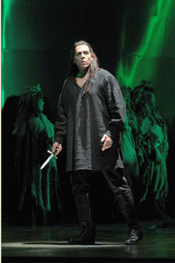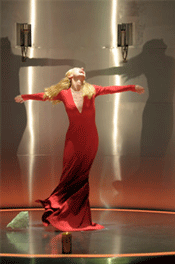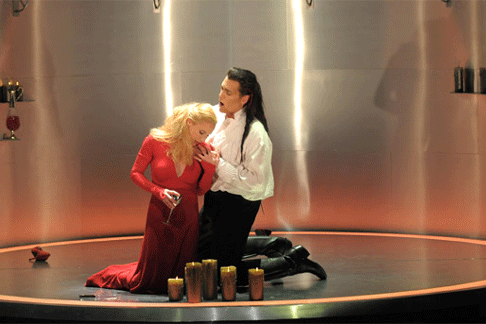On these two counts Lyric Opera of Chicago’s
new conception of Macbeth scores a significant triumph. Under the
stage direction of Barbara Gaines, founder and artistic director of the Chicago
Shakespeare Theater, this new production is conceived as alternately expansive
and restricting, thus highlighting the ambitions and emotional as well as
political collapse of the royal couple’s murderous plans. In the title
role Thomas Hampson gives a multi-faceted depiction of this complex character,
his acting and singing coalescing into a strong and individual interpretation.
All other leading roles in this production are very well cast by international
artists making their debuts this season at Lyric Opera: Nadja Michael as Lady
Macbeth, Štefan Kocán as Banquo, Leonardo Capalbo as Macduff, Konstantin
Stepanov as Malcolm, and Carter Scott as both Lady Banquo and the Lady in
Waiting. The Lyric Opera Orchestra is led by Renato Palumbo and Donald Nally
directs the generous contributions of the Lyric Opera Chorus.
 Thomas Hampson as Macbeth
Thomas Hampson as Macbeth
Before the overture begins the stage is sheathed by a cover approximating
armor, at the base of which is depicted a stylized forest with soldiers. The
brief overture under Palumbo’s direction showed sensitive attention to
tempo and orchestral colors with brief pauses and transitions well integrated
into the whole. At its close the stage covering opens at center to reveal the
simulated shooting flames of golden fire surrounded by a large chorus of hags.
Suspended above them and careening through the air are three witches who join
with the other groups below to recount their supernatural activities. At the
sound of drums Macbeth and Banco enter and demand that the witches identify
themselves. In answer they hail Macbeth, in succession, “di Caudor
sire” and “di Scozia re.” As Macbeth, Mr. Hampson declaimed
from the start in full voice while demanding a greeting from the witches. In
the role of his fellow general Banco Mr. Kocán layered his resonant voice with
dramatic effect, his diction showing an equally incisive understanding of
Verdi’s textual import. In their duet as a response to the first of the
witches’ predictions being realized both singers followed an effective
vocal line yet each differentiated the same in technical delivery. Hampson
moved impressively from piano to full dramatic voice, while Kocán used
a striking bel canto approach within a seamless and well projected
vocal range. As the pair departs and the chorus of witches predicts
Macbeth’s return [“Fuggiam, fuggiam!” (“Hasten away,
hasten!”)], the sets retract to show Lady Macbeth simultaneously in their
castle already reading Macbeth’s letter. This fluid transition connects
the two scenes directly, so that the Lady’s reaction gains immediacy upon
Macbeth’s revelation. In her pronouncements after a chilling recitation
of the letter Nadja Michael reveals a dramatically forceful delivery in which
she urges Macbeth to take courage and seize the opportunity of the moment. Ms.
Michael’s approach to this and subsequent scenes relies on several points
of vocal focus which she alternates with expressive transitions in order to
communicate a range of emotions. Her invocation of the spirits of the
underworld [“Ministri infernali”] to lend their evil support is
performed as several voices blending into one with softer downward runs
suggesting her own spiritual descent. During the aria Ms. Michael placed lit
candles about the room in a circle suggesting a further hope to ally herself
with demonic forces. Once Macbeth arrives with Duncan as guest, the couple
comes to agreement on the King’s fate in a mere several lines. In his
delivery of Macbeth’s soliloquy before the King’s chamber
Hampson’s excited emotions ascend to a crescendo as he intones the
self-convincing speech, his voice rising through the words
“assassino” (“murderer”) and culminating with dramatic
top notes on “Immobil terra!” (“Firm-set earth”). Once
the deed is declared done [“Tutto è finito”] Macbeth and the Lady
participate in a nervous exchange during which she takes a dominant role. Here
the voices of Hampson and Michael blended and alternately moved apart to
suggest their complex roles of dependency and revulsion. In the final scene of
this act Macduff and Banco enter to rouse the King and prepare him to journey
further. It is Macduff who discovers the murdered King and decries the vile
deed [“Orrore, orrore”]. Mr. Capalbo in a noteworthy debut sings
the role of Macduff with urgent, bright tones that command attention to his
honest pleas for the King’s memory. As everyone present sings in unison
to demand justice and counsel from God, Macbeth and the Lady join in condemning
the deed they have themselves committed.
 Nadja Michael as Lady Macbeth
Nadja Michael as Lady Macbeth
In Act II the royal couple descends to further iniquity with Lady Macbeth
taking the vocal lead in expressing complicity. Macbeth reminds her of the
predictions relating to Banco and the need to murder him in order to assure a
clear path to the throne. Lady Macbeth agrees in her haunting aria “La
luce langue” (“Light thickens”), which Michael sings with
understated hushed tones, capped by powerful high notes. As the scene changes
the assassins, who will kill Macbeth’s rival, position themselves on a
steep wall in a wooded park and practice their forthcoming attack. Their
pantomime is choreographed by the production team with dance-like movements
befitting the sprightly music composed by Verdi for the start of this scene.
Banco then arrives on the path with his son Fleanzio. Here the father issues
multiple warnings and speaks of his concern for safety and treachery. In his
major solo aria Kocán combined elegant legato phrasing in significant passages
[“sospetto” (“suspicion”)] with a rich tone culminating
in the convincingly delivered dramatic notes of “terror.” His son
is here whisked to safety by one of the suspended flying figures, returned from
Act I, as Banco succumbs to the assassins. The final scene of this act in the
banquet hall is staged with frenetic, drunken movements as King Macbeth is
confronted several times by the ghost of Banco. At the King’s urging the
Lady sings her toast “Si colmi il calice” (“Fill up the
cup”), interrupted repeatedly by Macbeth’s visions. In the faster
passagework of her aria Michael tended to sing sharp, an impression in
character on which she drew rather than giving steady, full voice to all
dramatic moments. The scene closes with the guests dismayed by their new
King’s mental abandon.
In the brief Act III Macbeth visits the witches again, the latter delivering
their seemingly impossible predictions for his defeat. In the orchestral
introduction Palumbo emphasized skillfully several themes from the earlier
overture, hence lending a sonic unity to the individual, collective scenes.
Hampson’s impressive confrontation and reaction in his vocal display made
use of forte singing that suggested a continued and desperate search.
After his address to the recurrent vision of Banco, Hampson modulated his voice
into an even, full line of returning courage that Lady Macbeth goads into
further deeds of violence. [“Ora di morte e di vendetta”
(“Hour of death and of vengeance”).
As Act IV begins the staging is redolent of suffering, calling out for the
pity of all who look upon this scene of the “Patria oppressa!”
(“Downtrodden county!”). Macduff proceeds from one group to another
at the start, as he then laments the murder of his family by Macbeth’s
forces. In his moving aria, “Ah, la paterna mano” (“Alas, a
father’s hand”) Capalbo shows himself as a true, Verdian lyric
tenor, with effortless and polished legato, secure top notes, and a skillful
placement of diminuendo. The scene remains one of several highlights
in the production. He is immediately joined by Malcolm as they plan to attack
the forces of Macbeth. Just as the two depart, Lady Macbeth is seen wandering
onto the stage, reminiscent of the technique used for her entrance during Act
I. Now she appears soiled, covered in blood, yet still holding a candle. The
sleepwalking scene is a true synthesis of Michael’s character
interpretation, her voice and acting joining into a specter of madness. In her
delusion she attempts to rouse Macbeth, who lays covered with a rag downstage
on the right. As he repulses her advances Michael sings with an effective blend
of dramatic force and extended piano notes while reliving their deeds of
violence. Her chilling conclusion on “il tuo pallor” (“your
pallor”) makes use of this technical shift in a final display of madness,
capped by a ghostly head note.
 Thomas Hampson as Macbeth and Nadja Michael as Lady Macbeth
Thomas Hampson as Macbeth and Nadja Michael as Lady Macbeth
The final scenes show Macbeth attempting to summon his courage one last time
before he hears news of the Queen’s death. Paradoxically, in his final
aria “Pietà, rispetto, amore” (“Compassion, honor,
love”) Hampson applies an elegance of phrasing and lyrical decoration to
give the image of Macbeth, on the point of defeat, still caught up in his
self-delusional trust in power. When he hears that he is now alone, he rushes
off to do battle against the forces of Malcolm. The final chorus of victory
declares that Macduff’s blow to Macbeth has restored trust to Scotland.
With this admirable, new production Lyric Opera of Chicago has likewise
restored Verdi’s Macbeth to it repertoire of artistic
achievements.
Salvatore Calomino
![Thomas Hampson as Macbeth and Nadja Michael as Lady Macbeth [Photo by Dan Rest courtesy of Lyric Opera of Chicago]](http://www.operatoday.com/Macbeth_Chicago_2010_04.gif)


